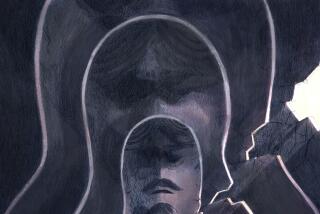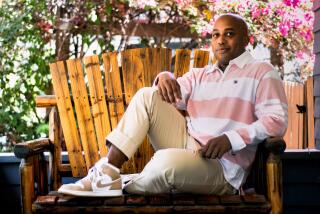MOVIE REVIEW : A PRODIGAL ‘NATIVE SON’ RETURNS
- Share via
Since it has taken 46 years for Richard Wright’s landmark novel “Native Son” (opening Christmas Day at the Century Plaza, Hollywood Pacific, Baldwin Complex and Laemmle Colorado) to become a major motion picture, it’s lamentable that it is an instance of making a molehill out of a mountain.
Much of Wright’s insight into the psychology of black rage has been shorn, the murder of a crucial character has been deleted, and the entire production has too much of a standard TV drama feel to it. Despite numerous vibrant performances, it lacks the raw tragic power of the novel, which, if anything, is timelier than ever. “Native Son” is too important a work of literature to merit such a mundane fate.
Its first third is by far its best, for Wright himself sets the stage so well that all director Jerrold Freedman and screenwriter Richard Wesley have to do is to go along with him. Nineteen-year-old Bigger Thomas (Victor Love) lives with his widowed mother (Oprah Winfrey) and younger brother and sister in a derelict, rat-infested room in a South Side slum in 1940 Chicago. We meet them on the day that Bigger is to start a new job. Consumed with an inarticulate rage at his plight as a poverty-stricken, oppressed black with little hope for the future, Bigger instead plans a store holdup with his pals.
A last-minute hitch cancels the robbery. Ironically, Bigger would probably have been better off engaging in a petty crime than going to work as a chauffeur with the Daltons, a rich, white, liberal family, who live in a stone Victorian mansion. In the ghetto Bigger has a surly swagger; in his new luxurious surroundings, the likes of which he’s never seen outside the movies, he’s all awed and humbled “Yessums” and “Yessuhs.” Dalton (John McMartin) and his blind wife (Carroll Baker) are unconsciously patronizing, but are transparently good people. (In the novel, however, Dalton is a slumlord who eases his conscience with donations to charity.)
Their warm, kindly Irish housekeeper (Geraldine Page) is a down-to-earth working woman much like Bigger’s own mother. But what Bigger is not remotely prepared for is the family’s beautiful, headstrong, politically radical daughter Mary (Elizabeth McGovern) and her Communist boyfriend Jan (Matt Dillon), whose well-meaning but foolish innocence proves so destructive to Bigger and themselves.
Bigger’s predicament, which leaves him with such tormented, contradictory emotions, is deftly set up, but Freedman and Wesley are not adept at generating suspense over Bigger’s eventual fate, which is needed to sustain the film’s central section but which plays with increasing flatness. (Our distraction permits us to wonder how and where Bigger learned to drive.)
By the time we arrive at the drama’s concluding courtroom sequence, “Native Son” has lapsed into drawn-out, mechanical predictability instead of developing a forceful, tragic inevitability. The film even fails to bring out the irony of a man discovering his humanity only in the face of death. How sad it is that Orson Welles never got to bring his celebrated Mercury Theater production of “Native Son” to the screen. For that matter, “Native Son,” with its hero’s struggle against his fate and its smoldering social criticism, could have made a great Fritz Lang film.
What we’re left with in this version is a really splendid central performance by the tall, intense newcomer Love, who so well expresses the anger, confusion, fear and despair that has all but strangled Bigger. Once again Winfrey radiates an earth mother’s strength and intelligence, and Page gives us one of her usual detailed portraits of a doughty type. Akosua Busia is Bigger’s lovely, lost girlfriend. However, “Native Son” comes truly alive only in the extended sequence in which Mary and Jan loudly insist on being familiar with Bigger to the extent of demanding he take them to a ghetto restaurant for dinner.
Their unintended humiliation of the young man, their utter lack of comprehension of what his life is all about or how cruelly they’re actually treating him is shattering in its pain and truthfulness. These scenes represent some of McGovern’s and Dillon’s best work, yet the film as a whole is so plodding that it can be said that when Mary dies, “Native Son” (Times-rated: Mature for adult themes) dies with her.
‘NATIVE SON’ A Cinecom release. Executive producer Lindsay Law. Producer Diane Silver. Director Jerrold Freedman. Screenplay Richard Wesley; based on the novel by Richard Wright. Camera Thomas Burstyn. Production designer Stephen Marsh. Music James Mtume . Film editor Aaron Stell. With Victor Love, Carroll Baker, Akosua Busia, Matt Dillon, Elizabeth McGovern, Geraldine Page, Oprah Winfrey, John McMartin, Art Evans, John Karlen, David Rasche, Lane Smith.
Running time: 1 hour, 52 minutes.
Times-rated: Mature.
More to Read
Only good movies
Get the Indie Focus newsletter, Mark Olsen's weekly guide to the world of cinema.
You may occasionally receive promotional content from the Los Angeles Times.







